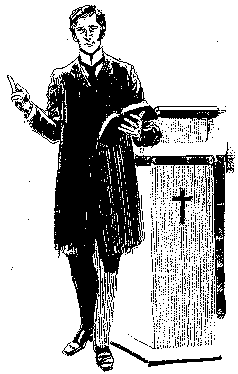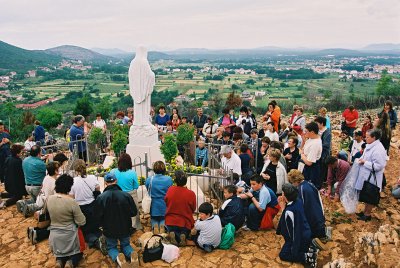 Pope Innocent III reigned from 1198 to 1216. He
excommunicated Markward of Anweiler. In passing the sentence of
excommunication, Innocent declared, "We excommunicate, anathematize, curse
and damn him" [Note 1]
Pope Innocent III reigned from 1198 to 1216. He
excommunicated Markward of Anweiler. In passing the sentence of
excommunication, Innocent declared, "We excommunicate, anathematize, curse
and damn him" [Note 1]
Innocent III and other popes ruled over kings and other secular rulers by using the "spiritual weapons" of excommunication and interdict. These "weapons" have been effective because Roman Catholics believe that the Pope has the power to deprive them of the grace which they need in order to get to Heaven. Excommunicated people are cut off from the Catholic Church, from church services, from Christian burial, and from the sacraments (communion, confession, baptism, confirmation, and marriage). [Note 2]
Because Catholics believe that the Catholic Church and the sacraments are necessary for salvation, this is, in effect, sentencing them to hell.
In 1014, Pope Leo IX excommunicated the entire Orthodox Church. This means that, according to Catholic theology, every single Orthodox priest, nun, layman, and laywoman is damned to hell unless they repent and submit to Rome. [Note 3] (If a modern Pope decides to remove that excommunication, then it will help Orthodox Christians who are alive today. But for nearly a thousand years, Orthodox Christians lived and died under that curse.)
Interdicts are a somewhat less severe form of excommunication which is applied to large groups of people, including entire nations. Baptism and the "last rites" are allowed, but all other sacraments are forbidden. Church services and Christian burial are also forbidden. If the Pope is in conflict with a secular ruler, then he can put the ruler's subjects under interdict in order to put pressure on the ruler. It works. The ruler's Catholic subjects put pressure on him to submit to the Pope, so that the Pope will remove the interdict. [Note 4]
It works. But at what price? What happens to the innocent people who had nothing to do with the conflict between their ruler and the Pope? They are allowed to receive the "last rites". But that only works for people who know that they are dying. What about people who die suddenly and unexpectedly? And because of the interdict they were not able to have a priest absolve them of their sins? According to Catholic doctrine, they go to hell. So in effect the Pope is willing to send people to hell in order to get political power over secular rulers.
Interdicts were used primarily during the
Middle Ages. But, as we will see, the interdict was used as recently as
1962.
Pope Innocent III (1198-1216) used interdicts and the threat of
interdicts eighty-five times in order to force secular rulers to submit to
him. He was so successful that kings declared that the Pope was their feudal
lord. For example, King John of England became the vassal of the Pope and
paid him an annual tribute. [Note 5]
Innocent III wore clothes covered with gold and jewels. He made kings and cardinals kiss his foot. [Note 6] In the papal bull "Deliberatio," Innocent declared,
"By me kings reign and princes decree justice." [Note 7]
[our note: The pope wrongly quoted from Proverbs. A fitting verse would be, Revelation 17:18 And the woman which thou sawest is that great city, which reigneth over the kings of the earth.
The woman of Revelation 17 sitteth on seven mountains (see Revelation 17:3, 9).
Pope Boniface VIII reigned from 1294 to 1303. On November 18, 1302, he issued the papal bull "Unam Sanctam" in which he declared that the Pope has both spiritual and worldly power. Boniface declared that there is no salvation apart from submission to the Pope. [This encyclical is on-line. Note 8 gives addresses.]
One of the most famous incidents of excommunication occurred when Pope Gregory VII excommunicated the Holy Roman Emperor, Henry IV. In order to receive forgiveness from the Pope, and to have the excommunication removed, Emperor Henry had to spend three days repenting in front of the castle where the Pope was staying. It was bitter cold (January, 1077). Henry spent most of his time kneeling in the ice and snow, weeping and pleading for forgiveness. When Pope Gregory finally allowed Emperor Henry to come into the castle, he publicly humiliated him. [Note 9]
Pope Gregory VII declared that the Pope has the right to depose kings and emperors, to make laws, and to require secular rulers to kiss his foot. He said that nobody has the right to judge the Pope. [Note 10]
Excommunication and interdicts are not ancient
history. The authority, and the procedure for exercising it, are in
existence today. The present Pope (John Paul II) has issued a new edition of
Roman Catholic Canon Law (the legal regulations of the Roman Catholic
Church). Canons 1331 and 1332 deal with punishments for people who have been
excommunicated or placed under interdict. Canons 1364 to 1399 deal with
penalties for "delicts" (offenses against Canon Law). These penalties
include excommunication and being placed under interdict. [Note 11]
INTIMIDATING VOTERS IN 1962
A modern example of spiritual intimidation is
the 1962 election in Malta (a small island in the Mediterranean Sea, near
Sicily).
Dr. Mark F. Montebello is a Catholic priest from the Island of Malta. He
wrote a series of three articles entitled, "Civil Rights in Malta's
Post-Colonial Age." The third article describes how the Archbishop of Malta
required Malta's Catholic priests to help him prevent Catholics from voting
for Mintoff (the Labor Party candidate) in Malta's 1962 election.
According to Dr. Montebello, the Archbishop instructed the priests to use
the sacrament of confession to coerce the consciences of Catholic voters. He
ordered the priests to threaten people with eternal damnation. He also
endorsed literature which contained "medieval intimidations" (the kind of
spiritual intimidation that was done during the Middle Ages). [Note 12 gives
the address of an on-line article.]
The Catholic Church officially declared that it
was a mortal sin to vote for Mintoff. Priests who failed to cooperate were
silenced. Some of them were forced to leave Malta and become missionaries in
foreign countries. [Note 13 gives the address of an on-line article.]
Maltese Catholics who voted for Mintoff were placed under interdict. It
became a mortal sin to vote for Mintoff. Catholics who voted for Mintoff
were banned from church life and from the sacraments. They were denied a
Christian burial. Instead, they were buried in a section of the cemetery
which was called "the rubbish dump," implying that the soul of the dead
person was damned. A citizen of Malta recounts,
"The Catholic Church used the pulpit, the confessional, the media and even public meetings in its vigorous campaign. I asked my father about his experience. When he went to confession, the priest asked him how he intended to vote in the general election and refused to give him absolution." [Note 14 gives the address of an on-line article.]
The Catholic Church categorizes sins as either
mortal sins (the most serious kind) or venial sins (which are considered to
be less serious). [Note 15] According to Catholic doctrine, if a person dies
in a state of mortal sin, then he or she is damned to hell. [Note 16] In
order for a mortal sin to be forgiven, a Catholic must go to confession and
receive absolution from a priest. [Note 17] However, if a Catholic is under
interdict, then he or she is not allowed to receive the sacraments, and
therefore cannot receive absolution for their sins.
So what happened to Maltese Catholics who voted for Mintoff? (1) According
to the Catholic Church, they committed a mortal sin. (2) They were placed
under interdict, and therefore they could not have that mortal sin be
absolved by a Catholic priest. (3) Therefore, they die in a state of mortal
sin. According to Catholic doctrine, that means that they go to hell.
There is one exception. A person under
interdict is allowed to receive the "last rites." However, this requires
that: (1) the person is close to death and knows that they are dying; (2) in
spite of being near death, they are in good enough shape mentally and
physically to be able to look for a priest (or to ask friends or family
members to look for a priest); (3) they are able to find a priest who is
willing to help them; and (4) the priest gets there in time to give them the
"last rites" before they die. According to Catholic doctrine, this means the
difference between Heaven and hell.
NOTES
CHAPTER 5 SPIRITUAL INTIMIDATION
1. Paul Johnson, "A History of Christianity" ( New York: Touchstone, Simon & Schuster, 1976, 1995), page 199. Paul Johnson is a prominent historian and a Catholic.
2. Bruce L. Shelley, "Church History in Plain Language," Updated Second Edition (Nashville, Tennessee: Thomas Nelson Publishers, 1982, 1995), page 185.
3. Malachi Martin, "The Decline and Fall of the Roman Church" (New York, G.P. Putnam's Sons, 1981), pages 133-134. Malachi Martin recently died. He was a Catholic priest, a Vatican insider, and the personal confessor of Pope John XXIII.
4. Bruce L. Shelley, "Church History in Plain Language," page 185.
5. Bruce L. Shelley, "Church History in Plain Language," pages 185-186.
6. Clifford Pereira, "Glimpses of Church
History, 1200 - 1300". On-line article.
http://www.goa-world.net/overseas-digest/Archives%202/history%208.html
7. Paul Johnson, "A History of Christianity," page 199.
8. Pope Boniface VIII, "Unam Sanctam," November 18, 1302. This is a short encyclical. The quotation is at the very end of it. This papal bull available on-line.
- http://www.geocities.com/papalencyclicals/Bon08/B8unam.htm
- http://faculty.juniata.edu/tuten/unam.html
- http://www.catholicism.org/pages/unam.htm
- http://www.newadvent.org/docs/bo08us.htm
- http://www.fordham.edu/halsall/source/b8-unam.html
9. Malachi Martin, "The Decline and Fall of the Roman Church," pages 137-145.
10. Paul Johnson, "A History of Christianity," pages 196-197. Malachi Martin, "The Decline and Fall of the Roman Church," page 140.
11. "Code of Canon Law," Latin-English Edition, New English Translation, pages 416, 427-435. Washington, DC: Canon Law Society of America, 1998.
12. Dr. Mark F. Montebello, "Civil Rights in Malta's Post-Colonial Age," Part III, "Independence According to the British," first subheading, "The Most Shameful Episode". This article is available on-line. The information is on page 1 of my print-out. http://www.maltamag.com/features/civil_rights3.html
13. E.C. Schembri, "The Making of a Statesman". This is an article about Mintoff, the Labor Party candidate in Malta's 1962 election. The information is on page 2 of my print-out. http://members.tripod.com/~bezzul/mintoff2.html
14. Joe Mizzi, "Liberty of Conscience". On-line
article by a citizen of Malta.
http://www.justforcatholics.org/a76.htm
15. "The Catechism of the Catholic Church" (Washington, DC: U.S. Catholic Conference, 2000), Paragraphs 1854-1856, 1863. The "Catechism" summarizes the essential and basic teachings of the Roman Catholic Church. It was approved by Pope John Paul II in 1992 and the English translation was released in 1994. The latest English edition was printed in 2000. It is available on-line, with a search engine.
16. "The Catechism of the Catholic Church," Paragraphs 1033, 1874.
17. "The Catechism of the Catholic Church," Paragraphs 1395, 1424, 1449, 1484, 1497.
END OF ARTICLE



